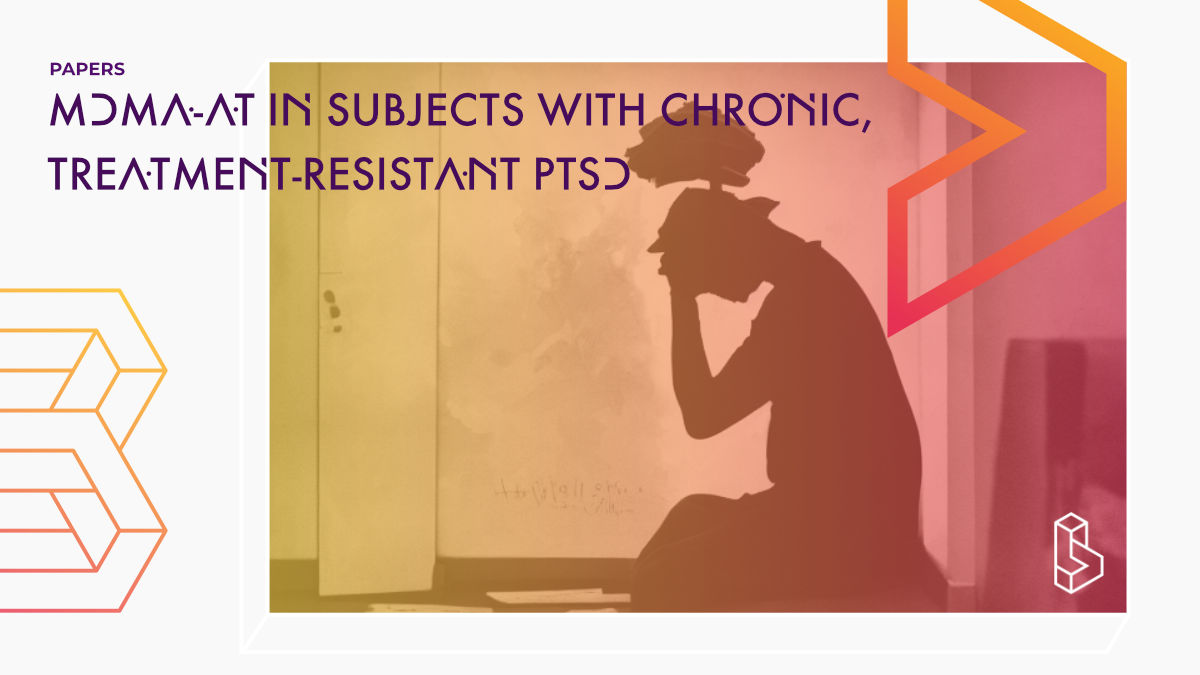This is the first placebo-controlled study (n=20) to shown the effectiveness of MDMA-assisted psychotherapy (MDMA-AT) in alleviating the symptoms of PTSD. Following two MDMA-AT sessions, 83% of participants in the active treatment group didn’t qualify for PTSD anymore (CAPS score).
Abstract
“Case reports indicate that psychiatrists administered ±3,4-methylenedioxymethamphetamine (MDMA) as a catalyst to psychotherapy before recreational use of MDMA as ‘Ecstasy’ resulted in its criminalization in 1985. Over two decades later, this study is the first completed clinical trial evaluating MDMA as a therapeutic adjunct. Twenty patients with chronic posttraumatic stress disorder, refractory to both psychotherapy and psychopharmacology, were randomly assigned to psychotherapy with concomitant active drug (n = 12) or inactive placebo (n = 8) administered during two 8-h experimental psychotherapy sessions. Both groups received preparatory and follow-up non-drug psychotherapy. The primary outcome measure was the Clinician-Administered PTSD Scale, administered at baseline, 4 days after each experimental session, and 2 months after the second session. Neurocognitive testing, blood pressure, and temperature monitoring were performed. After 2-month follow-up, placebo subjects were offered the option to re-enroll in the experimental procedure with open-label MDMA. Decrease in Clinician-Administered PTSD Scale scores from baseline was significantly greater for the group that received MDMA than for the placebo group at all three time points after baseline. The rate of clinical response was 10/12 (83%) in the active treatment group versus 2/8 (25%) in the placebo group. There were no drug-related serious adverse events, adverse neurocognitive effects or clinically significant blood pressure increases. MDMA-assisted psychotherapy can be administered to posttraumatic stress disorder patients without evidence of harm, and it may be useful in patients refractory to other treatments.”
Authors: Michael C. Mithoefer, Mark T. Wagner, Ann T. Mithoefer, Lisa Jerome & Rick Doblin
Notes
This study was preceded by Bouso et al. (2008) but that study only used lower dosages (also with a PTSD affected population).
A further analysis of the data on personality changes, notably Openness and Neuroticism was done by Wagner and colleagues (2017).
A long-term 17-74 months follow-up was done by Mithoefer and colleauges in 2012.
This study was sponsored by MAPS.
Summary of The safety and efficacy of ±3,4-methylenedioxymethamphetamine-assisted psychotherapy in subjects with chronic, treatment-resistant posttraumatic stress disorder: the first randomized controlled pilot study
Posttraumatic stress disorder (PTSD) is a debilitating anxiety disorder characterized by re-experiencing, hyperarousal and avoidance symptoms. It is a major worldwide public health problem and the limited effectiveness of existing treatments creates an urgent need for the development of new treatments.
Existing treatments for PTSD include both pharmacotherapy and psychotherapies, but most drugs have limited efficacy. Several meta-analyses have shown that pharmacotherapy can achieve complete remission in 30% of subjects in SSRI trials.
The most widely recognized methods of psychotherapy for PTSD are cognitive behavioural therapy, Eye Movement Desensitization and Reprocessing (EMDR), and psychodynamic psychotherapy. However, the evidence indicates that existing therapies for PTSD are ineffective for between 25% and 50% of patients who enrol in clinical trials.
MDMA is a ring-substituted phenylisopropylamine derivative that induces a 2 – 4 h experience typically characterized by euphoria, increased well-being, sociability, self-confidence, and extroversion. A pilot Phase II clinical trial was conducted to test the potential efficacy of MDMA as a therapeutic agent.
A pilot study using MDMA to treat people with chronic, treatment-resistant PTSD found that the drug decreased fear and increased interpersonal trust and that the drug was effective in reducing PTSD symptoms compared to psychotherapy in conjunction with an inactive placebo.
Authors
Authors associated with this publication with profiles on Blossom
Rick DoblinRick Doblin Ph.D. is the founder of MAPS. His persistent work since 1986 has been one of the main drivers behind why psychedelics (including MDMA) are now coming back to therapy.
Michael Mithoefer
Michael Mithoefer is a psychiatrist and a Clinical Investigator and acting Medical Director of MAPS Public Benefit Corporation.
Institutes
Institutes associated with this publication
MAPSMAPS stands for Multidisciplinary Association for Psychedelic Studies, it's the front runner in making psychedelics a legal way to use (and improve) in therapy.
Compound Details
The psychedelics given at which dose and how many times
MDMA 125 mg | 2xLinked Research Papers
Notable research papers that build on or are influenced by this paper
Durability of improvement in post-traumatic stress disorder symptoms and absence of harmful effects or drug dependency after 3,4-methylenedioxymethamphetamine-assisted psychotherapy: a prospective long-term follow-up studyThis study presents follow-up data (17-74 months; n=19) on a trial using MDMA-assisted psychotherapy to treat PTSD and found that most participants had maintained their therapeutic benefit over time.
Therapeutic effect of increased openness: investigating mechanism of action in MDMA-assisted psychotherapy
This follow-up study (n=20) finds that Openness (but not Neuroticism) plays a moderating role in the relationship between PTSD reduction following MDMA-assisted psychotherapy treatment.
Linked Clinical Trial
A Test of MDMA-Assisted Psychotherapy in People With Posttraumatic Stress DisorderThis randomized, double-blind, placebo-controlled trial (n=23) assessed the safety and effectiveness of MDMA-assisted therapy among people with chronic, treatment-resistant PTSD, including veterans.

